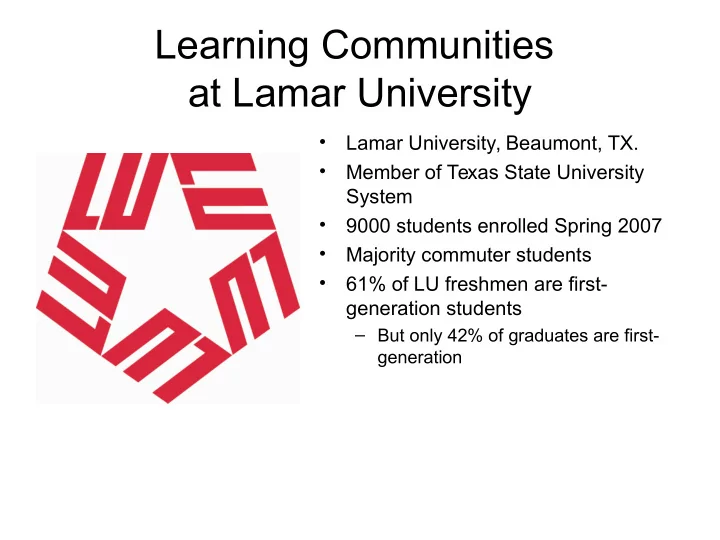

Learning Communities at Lamar University • Lamar University, Beaumont, TX. • Member of Texas State University System • 9000 students enrolled Spring 2007 • Majority commuter students • 61% of LU freshmen are first- generation students – But only 42% of graduates are first- generation
LC Inception and Justification • Began 2004 – University retention rate from Spring 2004 to Fall 2004: 66% – Large population of first-generation, commuters, and working students. – Intended to address academic, social, emotional, behavioral, and cultural needs of students. – Need for increased connection with university, and enriched academic and social experience. – LCs known for offering increased intellectual interaction, deeper learning, group identity, and enriched university experience.
Program Structure • Program staff: – Director and three student assistants • Coordinate with department advisors • Coordinate with departments to reserve seats in classes • Coordinate with campus resources to target LC student needs
Program Structure • Student cohorts based upon major. – 2004 began with Business, General Studies, Pre- Nursing, and Pre-professional – 2005 added Psychology to existing majors – 2007 developing Criminal Justice and Sciences majors (Biology, Chemistry, Physics, Mathematics) • Students co-enrolled with cohort and share common courses. • Cohort lasts Fall and Spring semesters of freshman year
Program Structure • Weekly study meeting built into each group’s schedule – Designated room in Student Center building for LC groups – Program staff checks in with students during meetings – Special presentations throughout semester: • Faculty representatives from respective LC major • Campus resources and activities • Attempt to identify unique student interests and encourage involvement
Program Structure • Students recruited for Fall semester during freshman Orientation in summer – When students report to advising offices in departments of major, they are given the chance to enroll in LC. • Previous LC students assist with promotion – Any student who enrolls is accepted; there is no application or screening process. If accepted into Lamar, students are able to enroll in LC program. – Limited to 20 students per major; first-come-first- serve basis.
Difficulties & Solutions • Budget limits resources to support students – Partner with campus programs and offices: tutoring, mentoring, advising, Student Affairs professionals • Small staff – Only one full-time employee (Dr. Daniel Bartlett) devoted to program • LCs one of several programs under direction of Dr. Bartlett – Time divided amongst several student retention initiatives Student assistants maintain regular phone and e-mail contact to keep LC students connected and updated. Previous LC students have volunteered time to meet new students.
Difficulties & Solutions • Large population of First-generation students, commuters, and working students. – Comfortable, personal network and support system through LC group and staff – Academic enrichment through study group – Academic support through program
Difficulties & Solutions • Student population has difficulty attaining involvement and connection with university experience – Comfortable, personal network and support system through LC group and staff – Departmental/faculty representatives meet students during weekly LC group sessions – Targeted interests by major – Small cohort allows personal connections by program staff
Difficulties & Solutions • LCs based on major can be tricky when many freshmen will change major – LC classes largely Core Curriculum – Students take courses of their choice outside of LC cluster as well – Changing major doesn’t disqualify students from LC; they can take the Core classes with LC group – Students still benefit from cohort support
Successes • University administration supportive • Faculty beginning to recognize benefits of LC to students as well as to teaching – Ex: English instructors report pleasant experience due to LC cohort involvement in class • Due to group connection and support, LC students have proven to be more likely to engage in class discussion and to be prepared for class. • Departments have been very willing to work with LC program. – Faculty and staff support in coordination
Successes • LC Retention rates and GPA higher than university averages • Program growth – More students and increasing majors for LCs • Student Satisfaction – Students report high satisfaction with LCs
Assessment • Evaluate – Retention rates • Evaluate one year rates of persistence – GPA • Compared to University average • Following comparison groups by major and semester of entry – Student satisfaction • Surveys conducted at end of semesters in weekly study session as well as in LC classes.
Assessment • GPA – University Average: 2.3 – LC Average: 2.7 • First-year retention rates – 2004-2005 cohort: 45 of 57 students • 79% – 2005-2006 cohort*: 59 of 86 students • 67% (*in September 2005, Hurricane Rita closed campus for three weeks and caused dramatic reduction in enrollment still being overcome today) One year university-wide retention rates average 66% in years prior to Hurricane Rita
Assessment • Student surveys – 91% of LC students would participate again – 90% would recommend LCs to a friend Engagement 85% of LC students reported socializing with other members of their LC
Assessment • LC Student Survey – Students wrote in that the “best aspects of participating in Learning Communities” included: • Meeting other people in their major and making friends • Having people to depend upon • Seeing familiar faces in class and on campus • Easily comparing notes, studying, and communicating with classmates • Having a set time to meet and study
Summary • LCs are new at Lamar but have already demonstrated success in increasing retention, GPA, and student satisfaction. • New LCs are in development with other majors. – Will develop LCs that cross majors but cluster based upon similar degree plans (ex: Fine Arts, Sciences, Education)
Thank you Dr. Daniel Bartlett Box 10221 Lamar University Beaumont, TX 77710 409-880-8115 dcbartlett@my.lamar.edu I welcome your comments, suggestions, or questions.
Recommend
More recommend